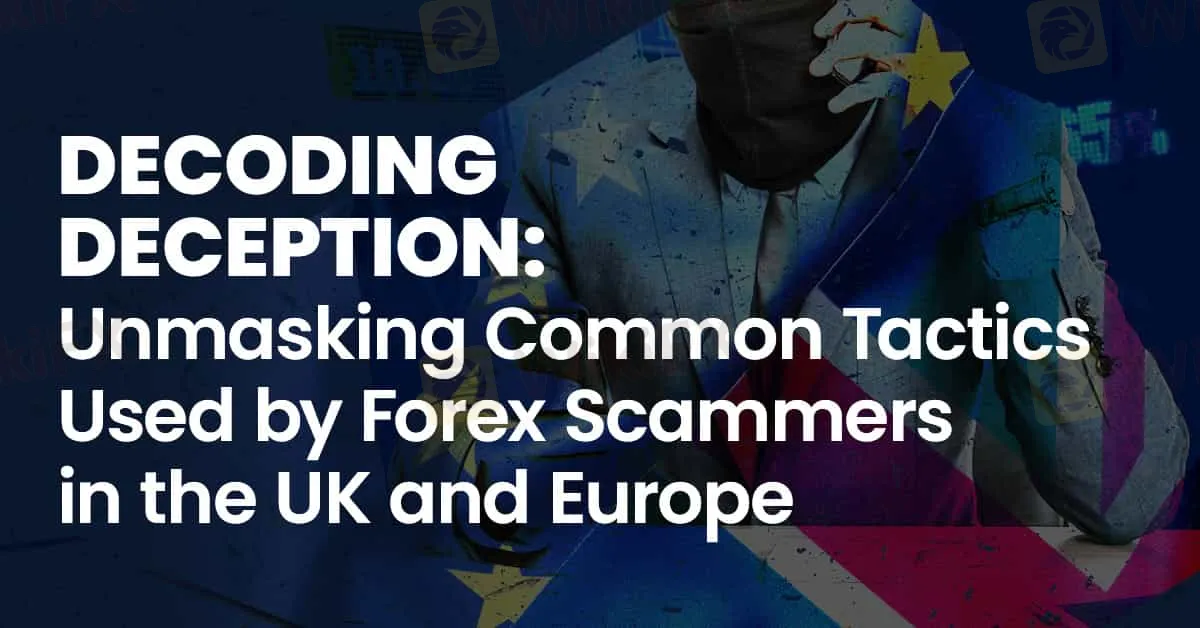简体中文
繁體中文
English
Pусский
日本語
ภาษาไทย
Tiếng Việt
Bahasa Indonesia
Español
हिन्दी
Filippiiniläinen
Français
Deutsch
Português
Türkçe
한국어
العربية
Decoding Deception: Unmasking Common Tactics Used by Forex Scammers in the UK and Europe
Abstract:In the dynamic world of forex trading, the promise of substantial profits can often be a siren song that leads unsuspecting traders into the clutches of scammers. The United Kingdom and Europe, despite their robust financial systems, have been grappling with a surge in forex trading scams. In this article, we will explore the insidious tactics employed by these scammers, shedding light on the methods that have been particularly prevalent in the UK and Europe.

In the dynamic world of forex trading, the promise of substantial profits can often be a siren song that leads unsuspecting traders into the clutches of scammers. The United Kingdom and Europe, despite their robust financial systems, have been grappling with a surge in forex trading scams. In this article, we will explore the insidious tactics employed by these scammers, shedding light on the methods that have been particularly prevalent in the UK and Europe.
Unveiling the Web of Deceit: Common Tactics Used by Forex Scammers
Forex scammers are adept at exploiting the vulnerabilities of traders, employing a range of tactics that can be difficult to detect. One of the most common strategies is the creation of fake brokers who present an illusion of legitimacy. These entities lure traders with promises of minimal risk and extraordinary returns, only to vanish with their funds, leaving victims in financial ruin.
Ponzi schemes are another insidious tactic employed by forex scammers. These schemes rely on a constant influx of new investments to pay returns to earlier investors, creating a mirage of profitability until the inevitable collapse. As the scheme unravels, investors are left grappling with the harsh reality of lost funds and shattered dreams.
The Regulatory Response: A Constant Cat-and-Mouse Game
The financial regulatory bodies in the UK and Europe, including the Financial Conduct Authority (FCA) and the European Securities and Markets Authority (ESMA), have been actively working to curb these deceptive practices. However, the evolving nature of forex scams requires continuous adaptation of regulatory frameworks to keep pace with the increasingly sophisticated tactics employed by scammers.
Learning from the Past: Notable Cases of Forex Scams in the Region
Examining specific cases provides a stark reminder of the real-world impact of forex scams on unsuspecting victims. Instances of fake brokers swindling investors with promises of unparalleled returns or Ponzi schemes collapsing under the weight of their own deception highlight the need for heightened awareness and vigilance among traders in the UK and Europe.
Identifying Red Flags: How Traders Can Protect Themselves
To safeguard themselves from falling victim to forex scams, traders must be vigilant and informed. Red flags include unsolicited communication from brokers, promises of guaranteed profits, and a lack of transparent information about the trading platform. Traders should conduct thorough research, verify the credentials of brokers, and be cautious of any pressure tactics employed by seemingly reputable entities.
Empowering Traders: How WikiFX Can Help
In the quest for a safer trading environment, WikiFX emerges as a valuable ally for traders. This comprehensive platform offers a wealth of information about brokers, including regulatory status, user reviews, and reports of scams or fraudulent activities. By utilizing WikiFX, traders can make informed decisions, steer clear of potential scams, and contribute to a safer trading landscape.
Visit www.wikifx.com to access WikiFX and equip yourself with the tools needed to navigate the complex world of forex trading.
Conclusion: A Call to Vigilance in Forex Trading
As the prevalence of forex trading scams continues to rise in the UK and Europe, traders must arm themselves with knowledge and vigilance. By understanding the common tactics employed by scammers, staying informed about regulatory measures, and utilizing resources like WikiFX, traders can navigate the forex market with confidence, avoiding the pitfalls that threaten their financial well-being.

Disclaimer:
The views in this article only represent the author's personal views, and do not constitute investment advice on this platform. This platform does not guarantee the accuracy, completeness and timeliness of the information in the article, and will not be liable for any loss caused by the use of or reliance on the information in the article.
Read more

Georgia Man Charged in Danbury Kidnapping and Crypto Extortion Plot
Georgia man James Schwab charged in Danbury kidnapping tied to $230M crypto heist. Plot targeted couple for ransom after Miami altercation with son.

Galaxy Digital Settles $200M in Luna Token Manipulation Case
Galaxy Digital pays $200M to settle Luna token manipulation probe by NY regulators, linked to TerraUSD’s 2022 crash, impacting crypto market stability.

Common Tactics Used in Online Trading Fraud Today
Know the top online trading scams of 2025, from fake apps to pump-and-dump tricks. Simple tips to spot and avoid them, keeping your money safe in this easy guide.

Exposed by SC: The Latest Investment Scams Targeting Malaysian Investors
The Securities Commission Malaysia (SC) has updated its Investor Alert List for March 2025, warning the public about unlicensed investment schemes and fraudulent financial entities.
WikiFX Broker
Latest News
Exposing the Top 5 Scam Brokers of March 2025: A Closer Look by WikiFX
Gold Prices Climb Again – Have Investors Seized the Opportunity?
Webull Launches SMSF Investment Platform with Zero Fees
Australian Regulator Warns of Money Laundering and Fraud Risks in Crypto ATMs
The Withdrawal Trap: How Scam Brokers Lure Victims into Paying More
FCA to Investors: Think Twice Before Trusting These Brokers
Trump\s tariffs: How could they affect the UK and your money
Trump gambles it all on global tariffs he\s wanted for decades
HTFX Spreads Joy During Eid Charity Event in Jakarta
How Will the Market React at a Crucial Turning Point?
Currency Calculator







